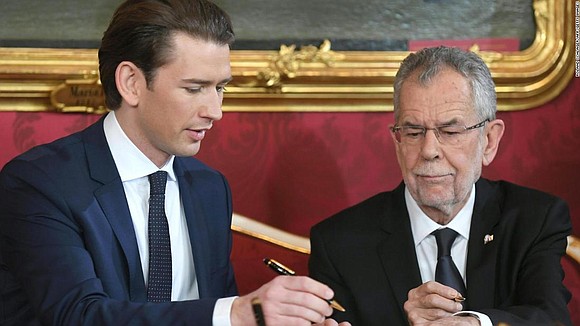Coalition Government with Far-right Party Takes Power in Austria
CNN/Stylemagazine.com Newswire | 12/18/2017, 10:55 a.m.

By Hilary Clarke, Stephanie Halasz and Judith Vonberg
(CNN) -- Austria's new coalition government, which includes the far-right Freedom Party, was sworn in on Monday as demonstrators protested outside.
Austrian President Alexander Van der Bellen, a member of the Green Party, presided over the ceremony on Monday at Vienna's Hofburg Palace.
The new Chancellor is the leader of the centre-right People's Party, Sebastian Kurz, who at 31, is the youngest leader in the world.
The Vice-Chancellor is Heinz Christian Strache, 48, a former dental technician and the Freedom Party's leader.
Police say between 5,000 and 6,000 people attended a demonstration against the new government in Heldenplatz square in front of the palace as the inauguration ceremony was underway.
Protests outside ceremony
Bearing placards like "Don't Let Nazis Govern," the protesters included women's groups and left-wing parties. Austrian police said in a tweet some "pyrotechnical" missiles were thrown by demonstrators.
"After throwing several pyrotechnical objects, they are being asked to stop doing so," the police said.
Even so, protests were muted compared to the last time the far-right entered government in Austria in 2000, when demonstrations nearly brought Vienna to a halt.
"As representative of all Austrians I have the will and the well-being of everyone in mind," President Van der Bellen said in a tweet.
"Incidentally, the same applies also to the new government. From now on, it too has to take the well-being of all Austrians into account," he said.
When the Freedom Party joined the coalition in 2000, the European Union slapped sanctions on Vienna to protest the presence of the far-right in the birthplace of Adolf Hitler.
So far this time, the response from Austria's EU partners has been cautious.
German Chancellor Angela Merkel said in a press conference Monday she hoped Austria would remain "an active partner in Europe." She did not mention the far-right.
She later called Kurz and invited him to come to Berlin soon.
President of the European Council Donald Tusk issued a statement saying: "I trust that the Austrian government will continue to play a constructive and pro-European role in the European Union.
"This is especially important at a time when the European Council is engaging more directly on politically sensitive issues in the context of the Leaders' Agenda. I am looking forward to meeting you soon and to closely cooperating with you during the Austrian Presidency of the European Union in the second half of 2018".
Kurz is set to travel to Brussels Tuesday for a meeting with Tusk and European Commission President Jean-Claude Juncker. He will meet Wednesday with Antonio Tajani, President of the European Parliament.
Immigration on new government's agenda
Unlike in Germany, where the success of the far-right Alternative for Germany (AfD) party in recent elections caused a seismic shock, the Freedom Party has long been part of Austria's political landscape.
Founded by former Nazis in the 1950s, it first entered government 17 years ago, the first far-right party to do so in postwar Europe.
Strache has sought to modernize the party, though accusations of anti-Semitism and Islamophobia continue to linger.
Austria took in around 90,000 asylum seekers in 2015, representing about 1% of its population, many fleeing the war in Syria.
The new Austrian government's program includes pledges to stop illegal immigration and slash taxes as well as oppose further EU political and economic integration. In a coalition statement following their agreement on Friday the new government said it wanted to "steer the EU back in the right direction towards its fundamental ideas," meaning less centralized decision making.
It also plans a clampdown on asylum seekers, offering only temporary protection.
"Immigration into the Austrian social welfare state...must be stopped," the coalition said.
The coalition said it was prepared to close Islamic schools to prevent what it described as "the creation of parallel societies."
Turkey expresses concern
Some of the strongest reactions to the new government came from Turkey.
"Islamophobic, antisemitic, xenophobic and anti-migrant parties are on the rise. Now this movement is in power in Austria," tweeted Omer Celik, Turkey's EU Affairs Minister.
The World Jewish Congress also expressed unease.
"It is severely disquieting that despite the many real concerns known and expressed about the (Freedom Party), it will now retain a position of serious influence, giving the Austrian government a real push even further to the right," WJC President Ronald S. Lauder said in a statement published on the WJC website.
Right-of-center politicians were more positive.
Alice Weidel, co-leader of Alternative for Germany, tweeted "Austria will change, and drastically. And I'm looking forward to that!"
The AfD entered the German Parliament for the first time after emerging from federal elections in September as the country's third-largest party.



